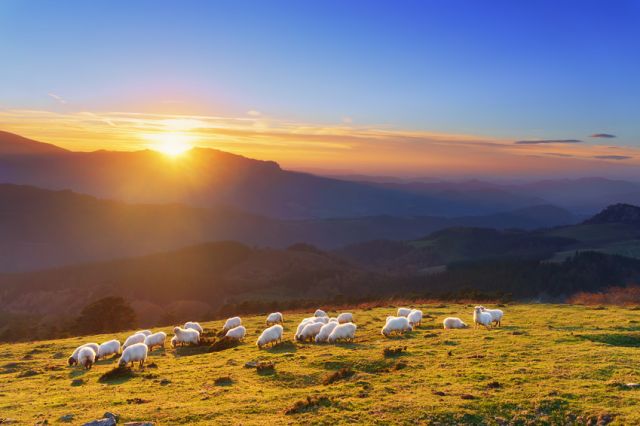- Home page
- Tourism
- Discover
- Visiting the Basque Country
- Soule
- Visiting the Basque Country
- Discover
- Tourism
Soule
Automatic translation

"xiberoa"
Although it is the most typical of the Basque provinces, Soule is also the smallest and least populated. It corresponds to a valley, the Saison valley (tributary of the Gave de Pau) which extends from the Pic d'Orhy in the South, the highest Basque peak, to the Hôpital Saint Blaise.
Soule is a mountainous region with steep valleys, deep forests, populated by shepherds and their flocks. It is the region of espadrilles and sheep's cheese, of an intact Basque culture, made of traditions, songs and dances.
You will love Soule for:
- his hikes;
- its authenticity;
- its architecture close to that of neighboring Béarn ;
- its heritage, Romanesque art and typical chapels isolated in the heart of the mountain.
Discover Mauléon, capital of the Viscounts of Soule, Larrau, Sainte Engrâce, Tardets, Saint Blaise Hospital.
history
Like the rest of the Basque Country and here with perhaps even more acuity, we have always claimed and practiced a certain independence. Indeed, since the Middle Ages the Souletins have always arranged not to depend on anyone and this is still the case today with a slightly offbeat agricultural economy. Soule has been self-managed for centuries. Here it is a union, the Soule Union, which manages and administers, reporting only to the inhabitants. While in all the other French departments, what does not belong to individuals belongs to the state, in Soule, it belongs to the Union, that is to say to all the Souletins who co-manage it!
For example, the Union derives its income from logging and hunting by charging hunters who come from far away to hunt wood pigeons for rent.
At the bend in the road, you will then discover curious signs as you cross a forest: " Forêt Syndicale de Soule " reminding you that here you are in Soule, a very original region to visit for its change of scenery!

La Soule Today
Today, Soule is one of the sanctuaries of the preservation of the Basque soul, from ancestral pelota games to pastoral festivals. It is an agricultural region whose main industrial flagship is the manufacture of espadrilles in Mauléon.
The manufacture of Espadrilles
Mauléon espadrilles still supply 80% of national production today.
The espadrille appeared in the 18th century. Made from hemp imported from Asia and spun in Spain, the espadrille is flexible and light. It is part of the traditional Basque costume in the same way as the beret.
From the beginning, the espadrille was exported far from the Basque Country and in particular to the north of France where it was widely used by miners. Despite the competition, it has always been able to adapt with new materials or new products such as "Pataugas". Today, China is the main and fierce competitor. To counter this invasion, the companies of Mauléon created the label " Espadrille Française " and launched the brand " France Espadrille ".
The espadrille remains the emblem of Mauléon and a flagship product of the Basque Country.
To convince yourself, take part in the espadrille festival every year in Mauléon or go to the town's Tourist Office, where you will discover a giant espadrille entered in the Book of Records.
sheep cheese
A land of livestock and pastures, Soule invites you to follow the cheese route from Itxassou to Arette via Saint Étienne de Baigorry. You will discover the famous Basque sheep's cheeses including the AOC Ossau Iraty.
The raw milk sheep's cheese also called "Ardi Gasna" is a little dry and slightly salty when tasted. It is very appreciated with black cherry jam, or in sheep's milk curdled yogurt, another specialty of the region, called "mamia".
Discover our selection of good addresses for Basque cheeses and yogurts.
The Basque Country: a land of celebrations
A predominantly rural region, very Catholic, many rites, strong tourist development... All these elements explain why celebrations and festivals are a tradition in the Basque Country, and bring life to every village throughout the year.
Traditional songs and dances are part of these festivals, choral singing is a great Basque tradition as during religious festivals. In Soule, where respect for traditions is very strong, dances and pastorals, originating from the medieval Basque culture, punctuate the Souletine festivals.

Photo Credits ©Fotolia
Venta Biok
Venta Biok
BIOK Experiential Shopping - Quality at the best price We welcome you to BIOK Shopping Centers! Located in the ...
Dantxarinea
Bizipoz bar
Bizipoz bar
Discover the Bizipoz Bar, your new unique place to live on the Basque Coast! The BIZIPOZ BAR is an intergenerational ...
Saint-Jean-de-Luz
Jump Academy Bayonne
Jump Academy Bayonne
Come and discover your Jump Academy park for a pure moment of madness with family or friends! A 1500m² playground ...
Saint-Pierre-d'Irube
OUR CITY GUIDES IN EUROPE
By continuing to navigate, you authorize the deposit of third-party cookies for audience measurement purposes.
Some pages of the site offer videos whose platforms also deposit cookies.






